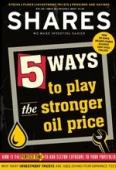Archived article
Please note that tax, investment, pension and ISA rules can change and the information and any views contained in this article may now be inaccurate.
What could happen to tech stocks if it all goes wrong?

Six of the world’s seven biggest companies by market capitalisation hail from the technology sector, which also offers 10 of the most valuable 25 companies. The six are Apple, Alphabet (Google’s parent), Amazon, Microsoft, Tencent and Alibaba.
Investors with exposure to this sector, either directly via technology stocks or specialist funds or indirectly via markets which have a heavy weighting in tech, such as the US or Asia, may see this as a reassuring vindication of their faith.
Others may be less sanguine, in the view that these stocks’ very size means they are implicitly the most popular stocks with investors right now – for this will remind many of investment legend Warren Buffett’s warning that: ‘You can’t buy what is popular and do well.’
The wisdom of Buffett’s words is supported by looking at two prior episodes when one or two sectors were particularly popular and were driving stock markets higher.
And any investor who bought into them when they were at the absolute height of their popularity, at the market peaks in 1999 and 2007, would have suffered some serious portfolio pain.
KING-SIZED HANGOVER
Those investors who were partying like it was 1999 as the tech, media and telecoms bubble took off will have enjoyed themselves, but only if they ultimately got out when everyone else was piling in.
On 31 December 1999, no fewer than 15 of the world’s 25 biggest companies came from the technology, media and telecoms (TMT) sectors. Buying all 25 in the view that what was working then would keep working would have inflicted losses on the investor over one, three, five and 10 years as well as to date.
• Buying the only hottest stocks of all – the TMT names – would have made the losses even worse.
• In total just nine of the 25 biggest companies (in 1999) have yielded capital gains for investors since the 1999 peak and only four – Microsoft, Intel, IBM and Oracle – are TMT companies.
One – WorldCom – even went spectacularly bust.
SUMMERTIME BLUES
The most popular stocks and sectors may have changed by 2007 but intrepid investors who snapped up the world’s 25 biggest stocks by market value that summer may have similarly encountered issues.
This time, it was energy stocks and financial services firms, especially banks, who dominated the leaderboard, helped by a surge in oil to $147 a barrel and booms in the US housing and global financial markets.
Anyone buying all 25 names at the July 2007 high would have just about got their money back in capital terms, even if only nine of the stocks have since generated a positive return. Only three of those names hail from the list of 12 energy and financial stocks which dominated the market cap rankings just over a decade ago.
PORTFOLIO PLANNING
There are four lessons which investors can draw from this data:
• Do not assume that what is working well now will always work in the future. New rivals, new technologies and simple management incompetence (a change in strategy, a bad acquisition) can quickly unseat even the most successful company.
• Do pay attention to a company’s balance sheet and cash flow, and not just its profit and loss account and share price momentum.
Those tech firms which managed to survive the 2000-03 TMT bust and even thrive generally had strong balance sheets laden with cash.
As a result, Microsoft has been able to reinvent itself and Intel has maintained its technological and scale edge in microprocessor production, for example.
The losers included the highly acquisitive and highly-indebted WorldCom, which turned into an accounting fraud; and Alcatel, whose defensive merger with American rival Lucent merely added complexity to an already difficult situation.
• Valuation matters. No matter how good the story looks, investors need to make sure that they are paying a reasonable valuation which leaves room for upside but also protects the downside if and when something goes wrong.
• It is hard to buy what is popular and do well for any sustained period of time. This is not to say that technology stocks, or markets in general, are about to implode. But it does hark back to Buffett’s aversion to buying what is popular and his preference for buying securities when no-one is interested, rather than when everyone is.
While it is tempting to think that we can time markets and get out before anyone else does, the chances are probably slim. On that point, we can again turn to Buffett who once wrote: ‘We have a lot of fun as the bubble blows up and we all think we are going to get out at five minutes before midnight – but there are no clocks on the wall.’
Russ Mould, AJ Bell investment director
Important information:
These articles are provided by Shares magazine which is published by AJ Bell Media, a part of AJ Bell. Shares is not written by AJ Bell.
Shares is provided for your general information and use and is not a personal recommendation to invest. It is not intended to be relied upon by you in making or not making any investment decisions. The investments referred to in these articles will not be suitable for all investors. If in doubt please seek appropriate independent financial advice.
Investors acting on the information in these articles do so at their own risk and AJ Bell Media and its staff do not accept liability for losses suffered by investors as a result of their investment decisions.
Issue contents
Big News
- Eurozone relief... but for how long?
- Good week for the markets but setbacks for Reckitt and Clarkson
- Stadium purchase to accelerate TT Electronic’s profits scale
- Online isn’t necessarily the ticket to retail success
- Should shareholders get involved with Capita’s £701m rights issue?
- Fast growth vaping firm Supreme to float on the stock market

 magazine
magazine











